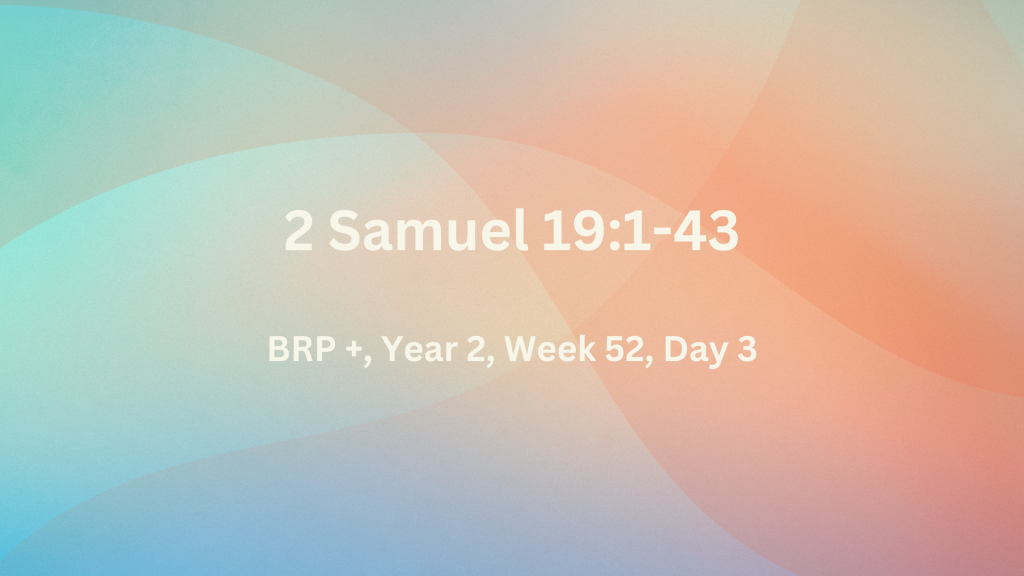2 Samuel 19:1-43
Q.1. How did David’s grief over the death of his son overshadow his army’s victory? How did they begin to heal the tribal division? – (2 Sam.19:1-15)
David was so devastated by the murder of Absalom that – the people went by stealth into the city that day, as people who are humiliated steal away when they flee in battle (2 Sam.19:3). Joab told King David bluntly that his action was tantamount to – loving those who hate you, and by hating those who love you (2 Sam.19:6). David heeded Joab’s advice and went out to greet his victorious army. Soon his army was encouraged by David’s show of gratitude (2 Sam.19:7-8). However, the Israelites who had been loyal to Absalom had returned to their homes, thus leaving the kingdom divided. To relieve the tension, David sent his loyal priests Zadok and Abiathar with this message to the commander appointed by Absalom – 13 Say to Amasa, ‘Are you not my bone and my flesh? May God do so to me, and more also, if you will not be commander of the army before me continually in place of Joab.’” (2 Sam.19:13 c.f. 2 Sam.17:25). As a result of this initiative, David was able to reunite all the tribes and return to his palace in Jerusalem (2 Sam.19:14-15).
Q.2. How would David’s response to disloyalty lay a foundation for the unity of his kingdom? What is the lesson for the church? – (2 Sam.19:16-30)
Few men had offended a king as greatly as did Shimei, the Benjamite. In spite of yet another attempt by Abishai (Joab’s brother) to execute him for his crimes, David protected him. David knew that further bloodshed would not unify his kingdom (2 Sam.19:16-23). Next, Mephibosheth (Jonathan’s crippled son), came out to meet David. David had been told of Mephibosheth’s disloyalty by Ziba, his servant. However, Mephibosheth’s account of the events was markedly different from that of his slanderous servant (2 Sam.19:24-28 c.f. 2 Sam.16:1-4). Since David didn’t know who to believe, he divided the estate between Mephibosheth and Ziba (2 Sam.19:29-30). We are urged to make every effort to avoid escalating disharmony. In this way David laid a foundation of a united kingdom (c.f. Eph.4:3).
Q.3. How did David reward those who had been loyal? What attitudes and arguments lingered on from the civil war? – (2 Sam.19:31-43)
Barzillai from Gilead beyond the Jordan River was very old. David encouraged him to join him in Jerusalem, so he could repay his loyalty. However, Barzillai resisted since he wanted to die among his family in a familiar environment (2 Sam.19:31-36). He did have an outstanding servant, whom he asked David to bless in his place. In this way the servant’s loyalty was richly rewarded (2 Sam.19:37-39). However, not all was well in the land. The other tribes felt slighted by Judah when they took David home to his palace. The men of Judah stated that they had not taken advantage of their tribal connection with the king (2 Sam.19:41-42). However, the other tribal leaders insisted – … We have ten parts in the king therefore we also have more claim on David than you. Why then did you treat us with contempt? Was it not our advice first to bring back our king? … (2 Sam.19:43). The stage was set for further strife in David’s kingdom.

